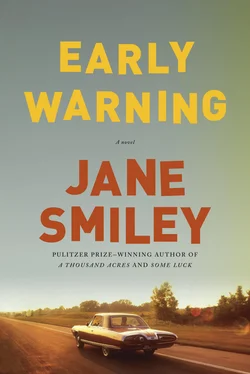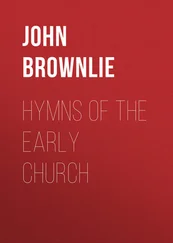Jane Smiley - Early Warning
Здесь есть возможность читать онлайн «Jane Smiley - Early Warning» весь текст электронной книги совершенно бесплатно (целиком полную версию без сокращений). В некоторых случаях можно слушать аудио, скачать через торрент в формате fb2 и присутствует краткое содержание. Год выпуска: 2015, Издательство: Knopf, Жанр: Современная проза, на английском языке. Описание произведения, (предисловие) а так же отзывы посетителей доступны на портале библиотеки ЛибКат.
- Название:Early Warning
- Автор:
- Издательство:Knopf
- Жанр:
- Год:2015
- ISBN:нет данных
- Рейтинг книги:5 / 5. Голосов: 1
-
Избранное:Добавить в избранное
- Отзывы:
-
Ваша оценка:
- 100
- 1
- 2
- 3
- 4
- 5
Early Warning: краткое содержание, описание и аннотация
Предлагаем к чтению аннотацию, описание, краткое содержание или предисловие (зависит от того, что написал сам автор книги «Early Warning»). Если вы не нашли необходимую информацию о книге — напишите в комментариях, мы постараемся отыскать её.
, a national best seller published to rave reviews from coast to coast.
Early Warning — читать онлайн бесплатно полную книгу (весь текст) целиком
Ниже представлен текст книги, разбитый по страницам. Система сохранения места последней прочитанной страницы, позволяет с удобством читать онлайн бесплатно книгу «Early Warning», без необходимости каждый раз заново искать на чём Вы остановились. Поставьте закладку, и сможете в любой момент перейти на страницу, на которой закончили чтение.
Интервал:
Закладка:
“A little after five.”
“Do you feel something?”
“What?”
“Do you feel our estate here, Belly Acres, rising up at every corner to enfold and suffocate us?”
“There is a lot of upkeep,” said Lillian, keeping her voice low, neutral. “You should”—but she had suggested that Arthur hire someone to help him before, and he had refused, so she said—“at least find a service to plow the driveway.”
“The thin end of the wedge,” said Arthur. “Ten years ago, I would have shoveled four inches of snow off this driveway in an hour, running and singing the whole time, and now I had to stop every few minutes and catch my breath.”
Lillian shivered again, though it wasn’t very cold, and said, “Maybe you should actually see a doctor.”
Arthur shook his head, as she knew he would. He hadn’t seen a doctor in years. I’ve had enough of that, he always said.
“What if I, your wife, want you to see a doctor?”
“You’re out of luck.” Then he turned her toward the house, putting his right arm over her shoulders and carrying the snow shovel in his left hand. They tromped up the driveway. He said, “I do feel sixty today, though. Every minute of it. When Colonel Manning was sixty, he walked thirty miles a day, keeping a list of wildflowers and birds that he saw on his march.”
“How old was he when I met him?”
“Sixty-six.”
“He had a twinkle in his eye.”
“Somehow,” said Arthur, “he did. Must have been a trick of the light.”
“You have a twinkle in your eye.”
“I take that as a compliment.”
While she was cooking dinner (green beans, too, with browned butter and almonds), they did their daily worrying about Debbie, Dean, and Tina, a prophylactic. Lillian talked to Debbie every day. Debbie told her about Carlie, Kevvie, Hugh, and the dogs. At the moment, the only thing wrong was that one dog had ear mites. Lillian and Arthur agreed that this was not worth worrying about. Dean had broken his wrist in a game of pickup basketball with eight guys who were taller than he was — he had gone for a rebound and hit his hand on the rim of the basket (pretty impressive), and would be in a cast for four more weeks. Lillian said, “How many broken bones is that over the years now?”
Arthur thought for a minute and said, “Eight, if you count the ribs as two.”
“Maybe this will teach him a lesson.”
“What lesson, though?”
“That he isn’t seventeen anymore?”
“I was hoping Linda was going to teach him that lesson.”
“So was she,” said Lillian.
Now for Tina. Tina had taken up the blowtorch. She lived in Seattle. She had sent a picture of herself, in her entire protective outfit, blowtorch in her right hand, hair gathered in a neat ponytail, gloves, helmet, standing in front of a slab of glass maybe an inch or more thick, three feet by four feet. She burned beautiful patterns in the glass, sometimes in the shape of animals or plants, but more often in astronomical designs — the solar system, the moons of Jupiter, six galaxies rotating in the distance. Her boyfriend, who still made his own cosmological paintings, then lit these so that the light came in from the edges somehow and illuminated the heavenly bodies. She’d shipped Lillian and Arthur a piece for their thirty-third wedding anniversary called Virginia Cowslips. In the note, she had written, “Hope you don’t find this too sentimental. I was in a funny mood.” Lillian did not find the image of her daughter bent over a blowtorch at all sentimental, but the piece was very pretty, and Lillian had put it on the dresser in their bedroom. Lillian said, “No news is good news for Tina.”
“No news is normal for Tina.”
“She’ll tell us if she gets pregnant. Even Janet told Andy when she got pregnant.”
They paused to worry about Janet for a moment. Andy had come back from Iowa City oohing and aahing as if she had never seen a baby before; to Lillian, Emily’s pictures looked like those of a normal baby and, indeed, of a Langdon baby, but, having somehow looked past her own babies, Andy was stunned by the new one.
Lillian said, “We could worry about Michael.” Michael had wrecked the car he shared with Richie — DWI, girl in the hospital for a week with a broken pelvis, and Michael himself, not wearing a seat belt, ramming his knee into the key in the ignition and painfully damaging the joint.
“Why bother?” said Arthur. “Worrying about Michael would be an existential exercise.”
“Jesse? Annie? Gray? Brad?”
“They have their complement of worriers,” said Arthur. “I don’t see any positions to fill.”
“I guess it’s time to eat, then.”
Arthur set the table, and Lillian dished up the food — always too much. She looked at Arthur out of the corner of her eye. He was the one she worried about: underweight, short of breath, ever alert (now it was the Iranians again). When she woke up to find him staring out the window at three in the morning, he would say that he just couldn’t sleep. When she asked what he was thinking about, he would say, “The fact that I can’t sleep.” Sometimes she thought he might have been awake all night, but he didn’t yawn or act tired in the normal way, just more wound up. Was he different or worse than he had always been? Lillian had no idea. Maybe she was the one feeling her age, not Arthur. Maybe he seemed a little strange to her because they were diverging in some way that she couldn’t pinpoint. She consciously dragged her gaze away from his plate (he had taken three bites, put down his fork, picked up a piece of bread) to her own, and said, “This turned out nicely.”
“Yes, it did.”
She didn’t ask why he wasn’t eating it. She said, “Maybe we should worry about Henry.”
“You mean because he took a semester’s leave of absence, moved to New York, and is living in the East Village, and no one has heard from him since before Christmas?”
“He’s forty-six years old. He shouldn’t have to check in if he’s going to be out after midnight.”
“Even if it’s been evident for a year that he is kicking over the traces and making up for lost time?”
“I have principles,” said Lillian.
“Name one,” said Arthur.
“What, me worry?” said Lillian.
Arthur laughed. When he did so, Lillian put a couple more beans on his plate. He seemed to like those.
—
JOE WAS HUNGRY after his appointment at the bank, and so he went to the Denby Café, sat down at the counter, and ordered a grilled ham and cheese. He was thinking about the interest he was going to pay on the seed he was about to buy, and whether he should forgo the loan and use most of his savings (but he didn’t want to do that). He knew what Lois was going to say, and Minnie, too, but both options made him nervous. How he had gotten to be one of the luckiest farmers in the area was pretty clear, and not only to him — Minnie had a good job, Lois had both a job and a store, the farm was paid off. Their house was like every kit house — strong, solid, and well put together — and Gary’s old house, buttoned up for the time being, was built to last, too. Did he need a new tractor? That depended on whether he cared about sitting on a seat or in a cab. On the seat, it was dusty and noisy, but he felt that he was seeing more. A cab would be quiet (not to mention cool), but if you were sitting in a cab, why be a farmer at all?
Then Dickie Dugan bumped into him, and he turned around. Dickie thrust a soiled check under his nose and laughed. Bobby Dugan had died a few months earlier — what had the paper said, that he was something like sixty-four, which didn’t seem all that old anymore — and the list of wives (three) and kids (nine) was pretty amazing. Dickie was the oldest boy. The check was for two hundred thousand dollars — not much in some ways, but impressive as a number being handed around the Denby Café. The Dugans had about three hundred acres just off the state highway. The check was signed by Frederick Sanford, CEO, Enterprise Pork Producers. Dickie said, “This is going to be a hog hotel, folks. Air-conditioned suite for every sow.”
Читать дальшеИнтервал:
Закладка:
Похожие книги на «Early Warning»
Представляем Вашему вниманию похожие книги на «Early Warning» списком для выбора. Мы отобрали схожую по названию и смыслу литературу в надежде предоставить читателям больше вариантов отыскать новые, интересные, ещё непрочитанные произведения.
Обсуждение, отзывы о книге «Early Warning» и просто собственные мнения читателей. Оставьте ваши комментарии, напишите, что Вы думаете о произведении, его смысле или главных героях. Укажите что конкретно понравилось, а что нет, и почему Вы так считаете.











